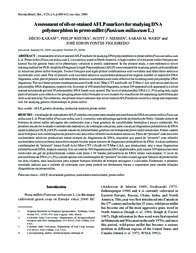Assessment of silver-stained AFLP markers for studying DNA polymorphism in proso millet (Panicum miliaceum L.).
Assessment of silver-stained AFLP markers for studying DNA polymorphism in proso millet (Panicum miliaceum L.).
Author(s): KARAM, D.; WESTRA, P.; NIESSEN, S. J.; WARD, S. M.; FIGUEIREDO, J. E. F.
Summary: Proso millet (Panicum miliaceum) is a serious weed in North America. A high number of wild proso millet biotypes are known but the genetic basis of its phenotypic variation is poorly understood. In the present study, a non-radioactive silver staining method for PCR Amplified Fragment Length Polymorphism (AFLP) was evaluated for studying genetic polymorphism in American proso millet biotypes. Twelve biotypes and 8 primer combinations with two/three and three/three selective nucleotides were used. Pair of primers with two/three selective nucleotides produced the highest number of amplified DNA fragments, while pair of primers with three/three selective nucleotides were more effective for revealing more polymorphic DNA fragments. The two better primer combinations were EcoR-AAC/Mse-CTT and EcoR-ACT/Mse-CAA with 7 and 11 polymorphic DNA fragments, respectively. In a total of 450 amplified fragments, at least 339 appeared well separated in a silver stained acrylamide gel and 39 polymorphic DNA bands were scored. The level of polymorphic DNA (11.5%) using only 8 pairs of primers were effective for grouping proso millet biotypes in two clusters but insufficient for separating hybrid biotypes from wild and crop. Nevertheless, the present result indicates that silver stained AFLP markers could be a cheap and important tool for studying genetic relationships in proso millet..
Publication year: 2006
Types of publication: Journal article
Unit: Embrapa Maize & Sorghum
Keywords: Diversidade genética, Marcador Molecular
Observation
Some of Embrapa's publications are published as ePub files. To read them, use or download one of the following free software options to your computer or mobile device. Android: Google Play Books; IOS: iBooks; Windows and Linux: Calibre.
Access other publications
Access the Agricultural Research Database (BDPA) to consult Embrapa's full library collection and records.
Visit Embrapa Bookstore to purchase books and other publications sold by Embrapa.

